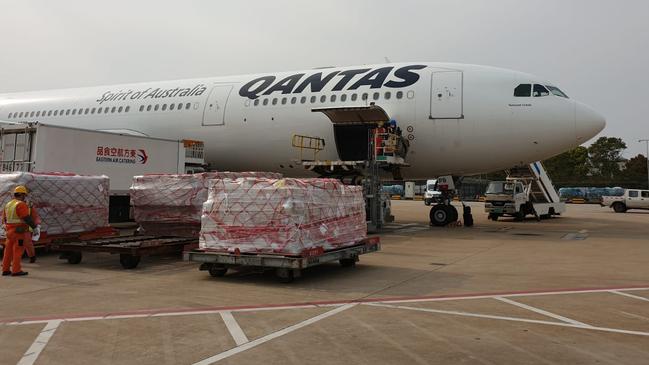Qantas freight flights pick up the slack as coronavirus restricts people travelling
Qantas A330s, normally used for people travelling to Hawaii, have landed a new gig flying freight to and from China.

Qantas is using its surplus passenger planes to collect vital medical supplies from Shanghai and keep trade links with China open during the coronavirus crisis.
Airbus A330-300s that normally carry travellers to Asia and Hawaii, will instead undertake five charter flights between Sydney and Shanghai this week.
Using every inch of aircraft belly space including that allocated for passenger baggage, the flights will bring back up to 30 tonnes of protective personal equipment for health workers on the front line of the coronavirus battle.
This includes hand sanitiser, masks and gowns which are in huge demand from hospitals and medical centre workers who are providing care for those infected with COVID-19.
On the outward leg, the flights will carry perishable exports such as salmon, dairy products and meat normally transported on regular passenger flights.
A Qantas spokeswoman said while commercial air travel had all but ceased, demand for global freight had heightened with the airline’s fleet of 12 dedicated freighters in full use.
“The federal government has recently announced the establishment of an international freight assistance support mechanism to support Australia’s agriculture and seafood export sectors and Qantas will work with the government on this initiative,” she said.
Qatar Airways is also jumping into the freight space, announcing twice weekly services from Doha to Melbourne and Perth using Boeing 777 freighters.
Each flight will make a tech stop in Singapore, and add 200 tonnes of cargo capacity each week, each way.
The flights are in addition to extra passenger services being operated by Qatar to Perth, Melbourne, Sydney, Canberra and Brisbane.
Qatar chief executive Akbar Al Baker said they were seeing soaring demand for supplies as the COVID-19 continued to impact the supply chain.
“We are pleased to provide these additional services to bring essential commodities, fresh produce, food products and medical supplies to Australia as we face this public health crisis,” Mr Al Baker said.
“We will also be transporting goods to other countries around the world to meet the demand for Australian products, further supporting the local export industry.”




To join the conversation, please log in. Don't have an account? Register
Join the conversation, you are commenting as Logout